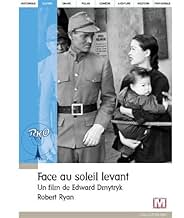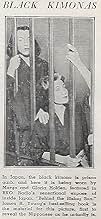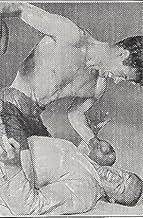In Japan, foreigners and their Japanese friends are caught up in the rising tide of militarism.In Japan, foreigners and their Japanese friends are caught up in the rising tide of militarism.In Japan, foreigners and their Japanese friends are caught up in the rising tide of militarism.
- Awards
- 1 win total
- Clancy O'Hara
- (as Don Douglas)
- Japanese Officer Murdering Takahashi
- (uncredited)
- Inspector
- (uncredited)
- Japanese Swordsman
- (uncredited)
- Japanese Girl
- (uncredited)
- Takahashi
- (uncredited)
- Japanese Officer with Message
- (uncredited)
- Dinner Guest
- (uncredited)
- Geisha Girl
- (uncredited)
- Director
- Writer
- All cast & crew
- Production, box office & more at IMDbPro
Featured reviews
There is a sideplot of the European and Americans living in Japan. American journalist Sara practically proposes to Clancy, but you can tell he is scared stiff of the idea of marriage even though he enjoys Sara's company. Sara feels rebuffed, and goes off to report in China on the Japanese occupation for years. Occasionally she runs into Taro, who becomes increasingly hardened to the violence around him.
Then Taro finally returns to Japan. And then December 7,1941 rolls around with his American friends still there, where things soon become very unpleasant.
The war was still on when this was made, so naturally Japanese actors couldn't have taken these parts even if they had wanted to take them. It does a good job of showing how traditions that had held fast in Japan for centuries - loyalty to family, belief in the emporer, the high esteem given to the military, could warp into something that becomes a killing machine under the right circumstances and the wrong leaders. I'd recommend it if you ever get a chance. It isn't as preachy as many films made during WWII about WWII.
J. Carrol Naish and Tom Neal with Oriental makeup on them play father and son. Naish a member of the rising new business class in Japan can afford to send Neal to Cornell in America. He comes back sporting new hep cat idioms of expression.
The film tries for some verisimilitude as Naish says that Japan is about to take its place in the world, that the white man is not a majority by any means in the world. Neal doesn't quite to make of his dad's militance but drinks it in far more than he realizes then. That bit of dialog I'm sure got noticed by the folks at House Un American Activities Committee headed around then by Mississippi racist John Rankin.
Later on the roles reverse as Naish decides his country has become to fascist with its Samurai based code of military behavior. Japan is the great example always held up by historians about the need for civilian control of the military. By then Neal is a true believer in the destiny of Japan.
Another thing that got HUAC's attention was George Givot playing the Russian journalist who becomes friend and benefactor to Americans caught in Japan after Pearl Harbor. A friendly portrayal of a Communist would certainly do the trick with the HUAC thought police.
At one point Neal and former employer engineer Don Douglas have a nasty confrontation and decide to settle it with seconds. Neal gets wrestler Mike Mazurki who excels in Judo. Douglas gets his friend Robert Ryan to go in for him. In real life Mazurki was a wrestler before turning to acting and being really good at it. Ditto for Ryan who did box as an amateur and both look like they know what they're doing. Both go into the ring using their arts. Ryan and Mazurki must have had one good laugh over it because the heavier and very agile Mazurki would have killed Ryan.
A couple of other key roles are Dorothy Thompson like reporter Gloria Holden and Margo playing the girl Neal wants to marry. Her heart is truly broken.
Behind The Rising Sun had some serious things to say, but in the end with that insulting makeup just doesn't hold up today.
Did you know
- TriviaA B-grade exploitation flick produced for $240,000, "Behind the Rising Sun" (1943) did A-level business at the box office, grossing $1.5 million. This was director Edward Dmytryk's second such hit for RKO that year, following the surprise blockbuster "Hitler's Children" (1943). Over the next four years Dmytryk gained the nickname "Mr. RKO" for consistently turning out profitable films for that studio.
- GoofsDuring the bombing of Tokyo, presumably the Doolittle raid, B-17 "Flying Fortresses" ( a heavy bomber) are shown carrying out the attack. The Doolittle raid was carried out by B-25 bombers, a medium bomber, launched from the aircraft carrier, USS Hornet.
- Quotes
Reo Seki: Do you know what this is?
Taro Seki: Of course. It's an air map. Say, it's a swell one too.
Reo Seki: You did some flying while you were in college, did you not?
Taro Seki: Yes, I had a pilot's licence.
Reo Seki: Good. Then you will understand quite easily.
Reo Seki: Observe, my son, when the Earth is spread out flat like the very air itself how there is no place in the world more than 60 hours from any other place, then Japan is no longer a little island at the end of beyond. Japan is the very centre of the universe. For the best airlanes lie to the north: Russia, Europe and North America. And we shall be masters of the north and of the east as well. That is quite inevitable.
Taro Seki: That's taking a lot for granted, isn't it?
Reo Seki: Not when you know your geography. Observe again: this is the heartland. Who holds the heartland, holds the world. For here is one fourth of the Earth's surface and one half of its population. Now take a good look, my son, and ask yourself: who is best fitted to hold the heartland? India, China or Japan? Who, in fact, is best fitted to hold the very world itself?
Taro Seki: But surely, Dad, you don't go for that stuff? Who would want to hold the world, even if he could?
Reo Seki: There was a time, my son, when we used to say: "Asia for the Asiatics". That was before we knew our strength. The white man is not only in the minority here; he is in the minority throughout the entire world. And the time will come when we shall see who is the master and who is the slave. That will be a great hour my son. It will belong to Japan. And Japan alone.
Taro Seki: But this isn't the Japan I've come home to work for.
Reo Seki: It is the only Japan there is. We must all rise with it or all perish with it.
- ConnectionsFeatured in Hollywood the Golden Years: The RKO Story: Dark Victory (1987)
- SoundtracksAlma Mater
(ca 1870) (uncredited)
(Cornell University's Marching Song)
Music by H.S. Thompson from his ballad "Annie Lisle" (1857)
Lyrics by Archibald Croswell-Weeks and Wilmot Moses Smith (ca 1870)
Sung by Tom Neal a cappella
- How long is Behind the Rising Sun?Powered by Alexa
Details
Box office
- Budget
- $239,000 (estimated)
- Runtime1 hour 28 minutes
- Color
- Aspect ratio
- 1.37 : 1




































